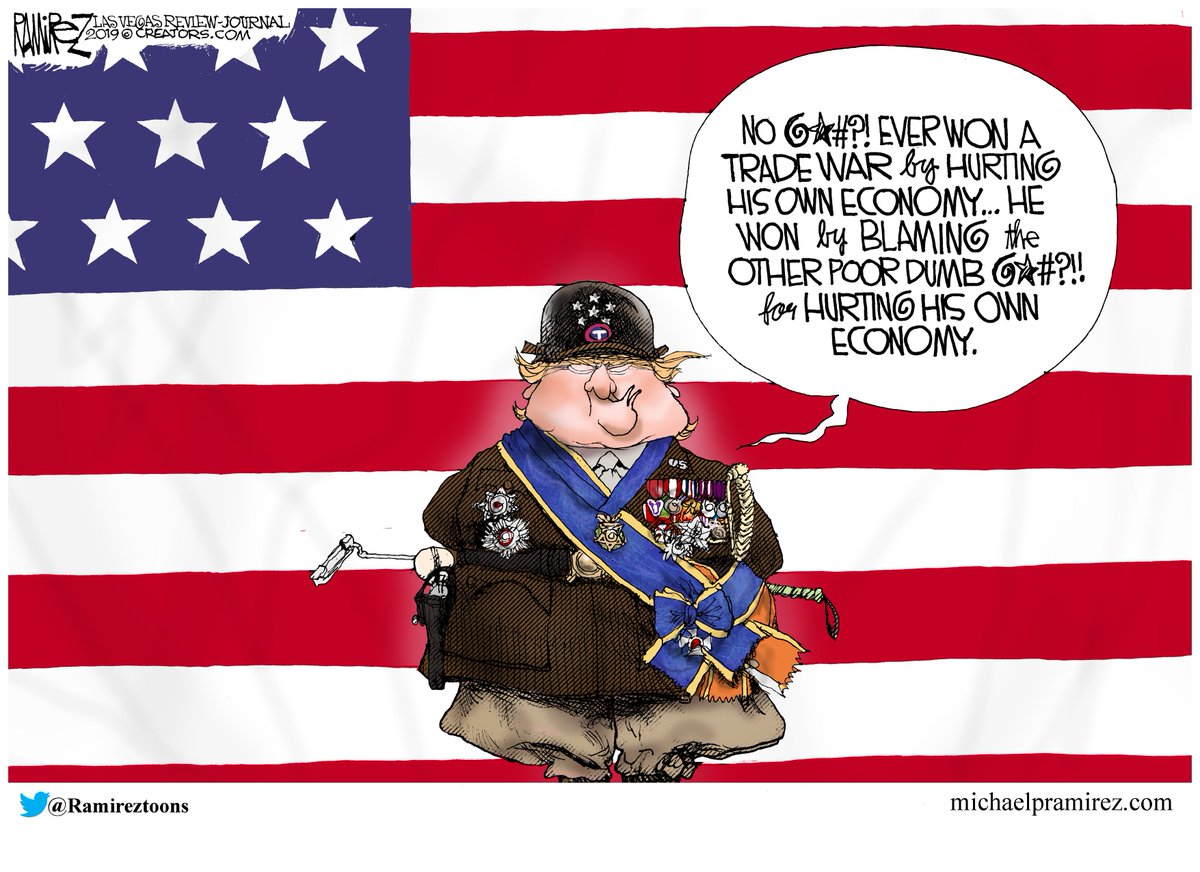On September 22, 1945, Gen. George S. Patton tells reporters that he does not see the need for “this denazification thing” and compares the controversy over Nazism to a “Democratic and Republican election fight.” Once again, “Old Blood and Guts” had put his foot in his mouth.
Tag: Patton
WINNING
General George S. Patton – Speech to 3rd Army June 5, 1944
Hat tip Kokoda
“Be seated.”
Men, this stuff that some sources sling around about America wanting out of this war, not wanting to fight, is a crock of bullshit. Americans love to fight, traditionally. All real Americans love the sting and clash of battle.
You are here today for three reasons. First, because you are here to defend your homes and your loved ones. Second, you are here for your own self respect, because you would not want to be anywhere else. Third, you are here because you are real men and all real men like to fight. When you, here, every one of you, were kids, you all admired the champion marble player, the fastest runner, the toughest boxer, the big league ball players, and the All-American football players. Americans love a winner. Americans will not tolerate a loser. Americans despise cowards. Americans play to win all of the time. I wouldn’t give a hoot in hell for a man who lost and laughed. That’s why Americans have never lost nor will ever lose a war; for the very idea of losing is hateful to an American.
Continue reading “General George S. Patton – Speech to 3rd Army June 5, 1944”
THIS DAY IN HISTORY
1944 –Patton relieves Bastogne
Enter “Old Blood and Guts,” General Patton. Employing a complex and quick-witted strategy wherein he literally wheeled his 3rd Army a sharp 90 degrees in a counterthrust movement, Patton broke through the German lines and entered Bastogne, relieving the valiant defenders and ultimately pushing the Germans east across the Rhine.
2004- Tsunami devastates Indian Ocean coast
TRUMP DEALING WITH A SOBBING SNOWFLAKE
THE ANTI-CINDERELLA MAN (PART TWO)
In Part One of this article I made a fact based case that most Americans are experiencing an economic depression on par with the Great Depression of the 1930’s. In Part Two I will compare and contrast two very different men who raised the spirits of the common man during difficult economic times. As we approach the perilous portion of this Fourth Turning, it will take more than hope to get us through to the other side.


Cinderella Man
Likening Braddock to Trump might seem far-fetched, until you think about parallels between the economic conditions during the 1930’s and today, along with the deepening mood of crisis, despair and anger at the establishment. Braddock’s career coincided with the last Fourth Turning. James J. Braddock was born in 1905, to Irish immigrant parents Joseph Braddock and Elizabeth O’Toole Braddock in a tiny apartment on West 48th Street in New York City. His life personified that of a GI Generation hero. One of seven children, Jimmy enjoyed playing marbles, baseball and hanging around the old swimming hole on the edge of the Hudson River as a youngster. He discovered his passion for boxing as a teenager.
Braddock refined his skills as an amateur fighter and in 1926 entered the professional boxing circuit in the light heavyweight division. Braddock overwhelmed the competition, knocking out multiple opponents in the early rounds of most fights. As a top light heavyweight, he stood over six feet two inches, but seldom weighed over 180 pounds. But his powerful right hand was no match for opponents that weighed close to 220 pounds. His star was ascending. He earned a shot at the title in 1929. On the evening of July 18th 1929, Braddock entered the ring at Yankee Stadium to face Tommy Loughran for the coveted light heavyweight championship. Loghran avoided Braddock’s deadly right hand for 15 rounds and won by decision. Less than two months later the stock market crashed and the country plunged into the Great Depression.
THE ANTI-CINDERELLA MAN (PART ONE)
There are several movies I will watch every time they are aired on one of my generally useless 600 cable channels. They all have the same thing in common – a compelling character portrayal which keeps you riveted and mesmerized by how the protagonist deals with adversity and circumstances beyond their control. The movies I can’t resist include: The Godfather I & II, The Green Mile, Shawshank Redemption, Apocalypse Now, and Patton. Another captivating movie, which didn’t do well at the box office, is Cinderella Man. The portrayal of Depression era heavyweight boxing champion James J. Braddock by Russell Crowe is inspirational, with a rousing and improbable victory by the champion of the common man. While watching this great movie a few weeks ago I found myself equating the themes to the current presidential campaign.
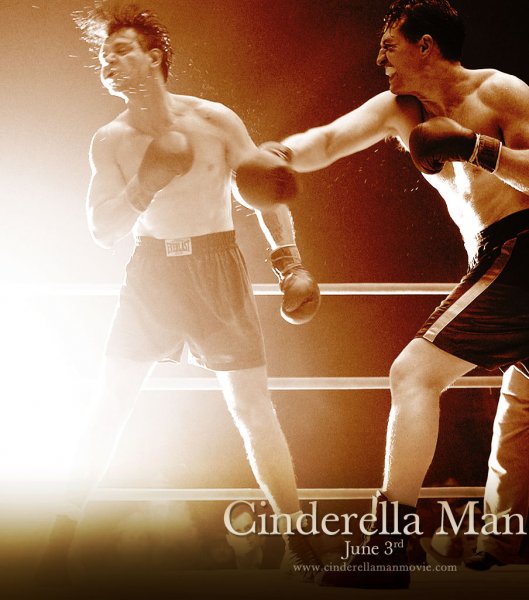

The Greater Depression
Braddock was an inspiration to all downtrodden demoralized Americans during the Great Depression. The parallels between the 1930’s Great Depression and today’s Greater Depression are uncanny, despite the propaganda emitted by the establishment politicians, media and banking cabal that all is well. The corporate mainstream media faux journalists scorn and ridicule anyone who makes the case we are currently in the midst of another Great Depression. They are paid to peddle a recovery narrative to keep the masses ignorant, sedated, and distracted by latest adventures of Caitlyn Jenner and the Kardashians. An impartial assessment of the facts reveals today’s Depression to be every bit as dreadful for the average American as it was in the 1930’s.
ALL GLORY IS FLEETING
“All glory is fleeting.” from Michael Mirasol on Vimeo.
NO ONE EVER WON A WAR BY DYING FOR THEIR COUNTRY

“NUTS”
On the 68th anniversary of General McAuliffe’s immortal response to the German commander during the Battle of Bastogne, I thought it would be worthwhile to post an article I wrote in April 2010, before the current version of TBP existed. During these times, we need leaders with the backbones of McAuliffe and Patton to step forward and lead. The current batch of leaders are proving unworthy.
“Now I want you to remember that no bastard ever won a war by dying for his country. He won it by making the other poor dumb bastard die for his country. Now there’s another thing I want you to remember. I don’t want to get any messages saying that “we are holding our position.” We’re not holding anything. Let the Hun do that. We are advancing constantly and we’re not interested in holding onto anything except the enemy. We’re going to hold onto him by the nose and we’re going to kick him in the ass. We’re going to kick the hell out of him all the time and we’re going to go through him like crap through a goose!”
“Men, all this stuff you’ve heard about America not wanting to fight, wanting to stay out of the war, is a lot of horse dung. Americans traditionally love to fight. All real Americans love the sting of battle. When you were kids, you all admired the champion marble shooter, the fastest runner, big league ball players, the toughest boxers. Americans love a winner and will not tolerate a loser. Americans play to win all the time. I wouldn’t give a hoot in hell for a man who lost and laughed. That’s why Americans have never lost, and will never lose a war… because the very thought of losing is hateful to Americans.” – George C. Scott as General Patton in opening scene of Patton
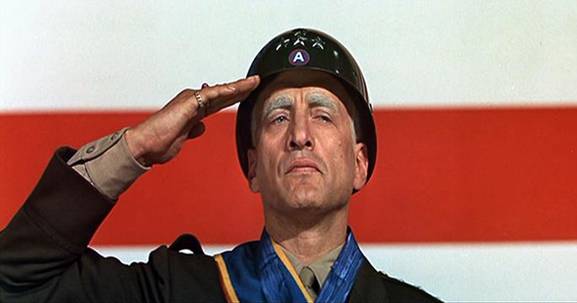
To the U.S.A. Commander of the encircled town of Bastogne.
“The fortune of war is changing. This time the U.S.A. forces in and near Bastogne have been encircled by strong German armored units. More German armored units have crossed the river Our near Ortheuville, have taken Marche and reached St. Hubert by passing through Hompre-Sibret-Tillet. Libramont is in German hands. There is only one possibility to save the encircled U.S.A. troops from total annihilation: that is the honorable surrender of the encircled town. In order to think it over a term of two hours will be granted beginning with the presentation of this note. If this proposal should be rejected one German Artillery Corps and six heavy A. A. Battalions are ready to annihilate the U.S.A. troops in and near Bastogne. The order for firing will be given immediately after this two hours term. All the serious civilian losses caused by this artillery fire would not correspond with the well-known American humanity.” – The German Commander
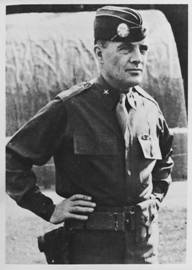
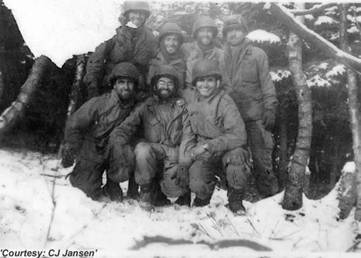
“To the German Commander, NUTS!” – Brigadier General Anthony McAuliffe
General McAuliffe was the acting commanding officer of the 101st Airborne in December 1944, besieged by a much larger German force surrounding the town of Bastogne, Belgium. Adolf Hitler launched a stunning surprise counterattack in the Ardennes Forest on December 16, 1944 committing 55 Divisions consisting of 500,000 soldiers, 1,800 tanks and 1,900 artillery pieces. The goal of the German offensive was the harbor at Antwerp. In order to reach it before the Allies could regroup and bring their superior air power to bear, German mechanized forces had to seize the roadways through eastern Belgium. Because all seven main roads in the Ardennes mountain range converged on the small town of Bastogne, control of its crossroads was vital to the German attack. The Allied command knew that Bastogne was the key to foiling the German offensive.
The 101st Airborne had performed fabulously during the Normandy Invasion and fighting in Holland. They were in reserve when the attack struck. General Eisenhower dispatched them to Bastogne on a 107 mile forced march at night in freezing rain on December 18. General McAuliffe was the acting commander, as General Maxwell Taylor was elsewhere. All seven highways leading to Bastogne were cut by German forces by noon of December 21, and by nightfall the assortment of airborne and armored infantry forces realized they were surrounded. The American soldiers were outnumbered and lacking in cold weather gear, ammunition, food, medical supplies, and leadership. Due to some of the worst winter weather in years, the surrounded U.S. forces could not be resupplied by air nor was tactical air support available. There were 11,800 American soldiers and they held off four Divisions (including 2 Armored) for one week.
Lesser men would have surrendered. The situation was hopeless but not desperate. Instead, General McAuliffe basically told the German General Luttwitz to go to hell. The Academy Award winning movie Patton captured the gung-ho never say die attitude of the World War II leaders.
General Smith: Our concern is that von Rundstedt has the 101st Airborne trapped here at Bastogne. Bastogne, by the way, is the key to this entire area. If we can hold it, we can break up the entire German offensive. If they take it, we’re in serious trouble. Ike wants to know if anybody can go and relieve the 101st before they’re torn to pieces.
General Tedder: There’s nothing Montgomery can do. At any rate, not for some weeks.
General Smith: What about you, George?
General Patton: I can attack with three divisions in 24 hours.
General Tedder: I’d give myself some leeway.
General Smith: Ike wants a realistic estimate, George. You’re in the middle of a fight now. It’s over a hundred miles to Bastogne.
General Patton: My staff’s already working out the details.
General Tedder: Frankly, I don’t see how it’s possible. Not in this kind of weather. I should have thought you’d want to fall back and regroup.
General Patton: Not me. I don’t like to pay for the same real estate twice.
General Tedder: But what about your men? You can’t cart them off 100 miles, expecting them to attack without rest.
General Patton: I trained these men. They’ll do what I tell them to do.
General Smith: We hadn’t realized you were so popular with your troops, general.
General Patton: I’m not. They’ll do it because they’re good soldiers. And because they realize, as I do, that we can still lose this war.
General Tedder: Then I think I can speak for Field Marshal Montgomery. He’d say you’re asking the impossible of your men.
General Patton: Of course he would, because he’s never realized that’s what we’re in business for.

In a later scene, as his men make phenomenal progress in their efforts to relieve Bastogne Patton tells one of his subordinates:
“This is where it pays off, the training and the discipline. No other outfit in the world could pull out of a winter battle, move a hundred miles, go into a major attack with no rest, no sleep, no hot food. God… God, I’m proud of these men!”
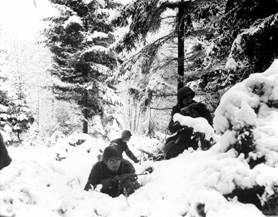
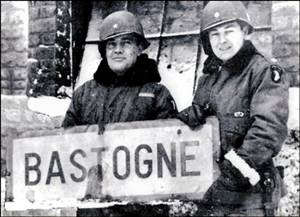
I consider the movie Patton one of the greatest movies ever made. George C. Scott gives a performance worthy of the Academy Award he refused to accept. It is not surprising that the screenplay was so brilliant. It was written by a thirty year old Francis Ford Coppola, three years before his masterpiece – The Godfather. The movie was made in 1970. The greatest song of all-time, American Pie, and one of the greatest movies of all-time were both produced at the same juncture in U.S. history. I don’t think this was a coincidence. The movie and the song came out amidst the Great Awakening period known as the Consciousness Revolution from 1964 until 1984. Both works of art reflected a longing for a different time in U.S. history. Don McLean, born in 1945, longed for the 1950s High of his youth, when music meant something and Americans cared about each other. Francis Ford Coppola was born in 1939 and longed for the splendor, glory and tenacity of the Generals and the bravery of the GI’s he admired as a child. But, there was no turning back. Every generation must fulfill their role in the four turnings of history.
THE LOST GENERATION
I think I’m drawn to the main characters in the movie Patton because they were all Nomads. I’m from the current Nomad generation referred to as the 13th Generation or Generation X. For those unfamiliar with Strauss & Howe’s book The Fourth Turning, here is a chart clarifying the concept of generation theory:
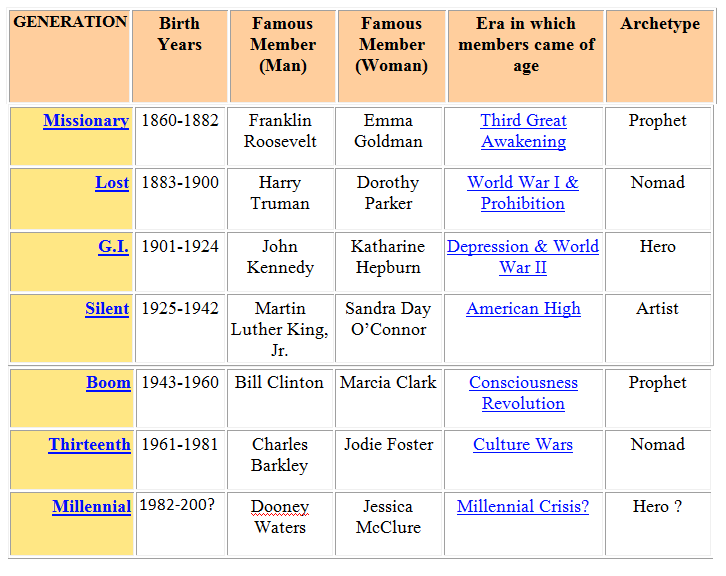
A human life lasts 80 to 100 years. Our lives pass through four stages: childhood, young adulthood, mid-life, and old age. Each 20 to 25 years represents a season of life. Strauss & Howe describe the four turnings of a generational saeculum:
The four turnings comprise a quaternal social cycle of growth, maturation, entropy, and death (and rebirth). In a spring like High, a society fortifies and builds and converges in an era of promise. In a summerlike Awakening, it dreams and plays and exults in an era of euphoria. In an autumnal Unraveling, it harvests and consumes and diverges in an era of anxiety. In a hibernal Crisis, it focuses and struggles and sacrifices in an era of survival. When the saeculum is in motion, therefore, no long human lifetime can go by without a society confronting its deepest spiritual and worldly needs.
Essentially, as humans pass through life they react in a predictable way to worldly circumstances. Each generation has a role to play during each Turning. The particular specifics of each Turning will be different, but the reaction of each generation will be the same. The social mood of the country changes at the outset of each Turning. We have entered the Fourth Turning. This Crisis period is a decisive era of secular upheaval, when the values regime propels the replacement of the old civic order with a new one. Old Artists disappear, Prophets enter elderhood, Nomads enter midlife, Heroes enter young adulthood—and a new generation of child Artists is born.
I have been looking for clues to how my generation will react during this Crisis.
WORLD WAR II CRISIS
“Wars may be fought with weapons, but they are won by men. It is the spirit of men who follow and of the man who leads that gains the victory.” – George S. Patton
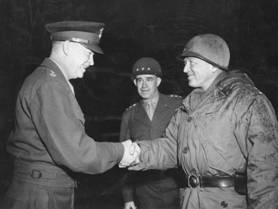
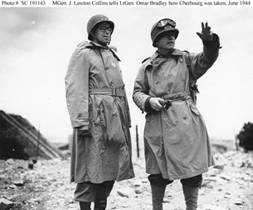
George Patton, Omar Bradley, Anthony McAuliffe, and Dwight D. Eisenhower were all members of the Lost Generation, born between 1883 and 1900. During a Fourth Turning Crisis every generation must play their assigned role. During this critical era of worldly mayhem, the old civic order is replaced with a new one. During the last Crisis, Prophets like Franklin Roosevelt, Douglas MacArthur, and George Marshall performed their roles as principled moralists, summoners of human sacrifice, and wagers of righteous wars. Everyone knows what the GI Generation Heroes did. They stormed the beaches of Normandy. They fought life or death battles with Japanese on volcanic islands in the Pacific. They sacrificed their lives during World War II. The Silent Generation was the overprotected children of the last Crisis. The generation that interests me the most is the Lost Generation. Strauss & Howe described these Nomads in this way:
“The Lost Generation (Nomad, born 1883-1900) grew up amidst urban blight, unregulated drug use, child “sweat shops,” and massive immigration. Their independent, streetwise attitude lent them a “bad kid” reputation. After coming of age as “flaming youth,” doughboys, and flappers, they were alienated by a war whose homecoming turned sour. Their young-adult novelists, barnstormers, gangsters, sports stars, and film celebrities gave the roar to the ‘20s. The Great Depression hit them in midlife, at the peak of their careers. The “buck stopped” with their pugnacious battlefield and home front managers of a hot war—and their frugal and straight-talking leaders of a new “cold” one. As elders, they paid high tax rates to support their world-conquering juniors, while asking little for themselves.”
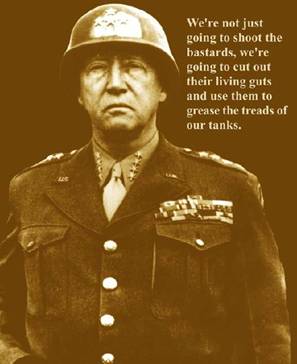
The Nomad generation is hell raisers in their youth. By midlife they become cunning hard to fool realists. No task is seen as impossible. Planning a secret amphibious invasion across the English Channel consisting of 1.3 million men, 7,000 Navy vessels, 12,000 aircraft was left to the Nomads of the Lost Generation like Dwight Eisenhower and Omar Bradley. Nomad leaders like George Patton didn’t flinch when required to disengage his entire Third Army from battle in the face of the enemy, march 100 miles in blizzard conditions in 48 hours, and immediately go into battle to relieve the siege of Bastogne. Nomads are hands on get it done leaders. Patton & Bradley weren’t sitting at desks directing their troops. They were with their troops, under fire. Patton was so intent on defeating his enemy that he commanded his chaplain to write a prayer to improve the weather. It worked. Even God had to admire his tenacity.
“Almighty and most merciful Father, we humbly beseech Thee of Thy great goodness to restrain this immoderate weather with which we have had to contend. Grant us fair weather for battle. Graciously harken to us as solders who call upon Thee that, armed with Thy power, we may advance from victory to victory, and crush the oppression and wickedness of our enemies, and establish Thy justice among men and nations. AMEN.” – George C. Scott as Patton
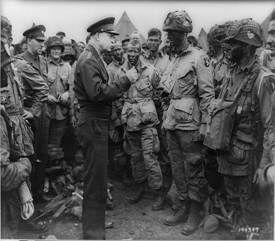
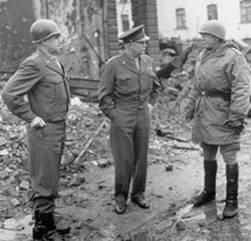
Nomads are introverted warriors who prefer to meet crisis and opponents one on one. In the movie, Patton reflected upon his desire to meet his chief adversary on the field of battle:
“You know, Dick, if I had my way, I’d meet Rommel face to face; him in his tank and me in mine. We’d meet out there somewhere… salute each other, maybe drink a toast, then we’d button up and do battle. The winner would decide the outcome of the entire war.” – George C. Scott as Patton
Nomads have always made great soldiers. George Washington and Ulysses S. Grant were Nomad warriors during the previous two Crisis periods who lead Heroes into battle and onto victory. The Lost Generation had to make the tough decisions. They had to send thousands of people to certain death in order to achieve the ultimate victory over their foes. Eisenhower made the decision to launch the Normandy Invasion that resulted in 120,000 Allied casualties. Harry Truman ordered the dropping of two atomic bombs resulting in the deaths of 200,000 Japanese in order to avoid the estimated 1 million casualties from an Allied invasion of mainland Japan. Patton regularly expected the impossible from his troops and they delivered. Why did these men have the intestinal fortitude to make such decisions? They were blessed with a thirst for liberty, a survival instinct and a sense of honor.
“Better to fight for something than live for nothing.” – George S. Patton
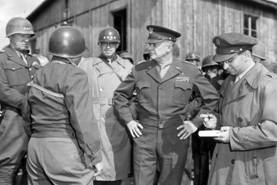
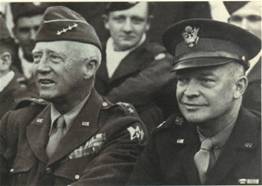
Nomads suffer a lifetime of criticism. During their youth their elders berate them as stupid, lazy and morally bankrupt. In midlife they are blamed for the decadence of the unraveling period. In old age they are seen as too cautious, old-fashioned and pessimistic. This lifetime of criticism makes Nomads tough as nails. They don’t care what people think about them. They are secure in their own judgment and don’t blink in the face of adversity. Their entire lives consist of hardship, danger, and harsh choices. Strauss & Howe described the adversity endured by the Lost Generation:
“During the First World War, the alleged stupidity of American youth became a raging issue when IQ tests indicated that half of all draftees had a mental age of under twelve. Afterwards, their morals came under attack from aging Missionaries. In the dark days of the Depression, when FDR blasted “a generation of self-seekers” for wrecking “the temple of our civilization,” clearly he meant the middle aged Lost, who throughout the 1930s were attacked as “Copperheads”, nay-sayers, “Irresponsibles,” and (as war approached) “isolationists.”
The Lost Generation grew up amidst intense social unrest, spiritual revivalism, enormous immigration, and unbridled drug abuse. World War I disillusioned them as they did not understand the purpose. During the 1920s they worked hard and partied hard. The Great Depression introduced doubt and loss of faith in them. But, their gritty upbringing came in handy during the hardscrabble 1930s. Their rough and tough upbringing prepared them for the ultimate test of World War II. They were prepared to do the “dirty work” that lie ahead. Strauss & Howe described their impact on that war:
“When World War II hit, the Lost shed their isolationism and provided the war-winning generals whose daring (Patton), warmth (Bradley), and persistence (Eisenhower) energized younger troops. At home, they managed the world’s most efficient war machine. With little philosophizing, their first president dropped two atom bombs and then arranged a peace that was less vengeful and more secure than the one he recalled from his own soldier days.”
The Lost Generation willingly sacrificed in their old age by paying exorbitant tax rates in order to allow younger generations to live a better life. Eisenhower’s eight years in the White House were marked by conservative fiscal policies, choosing to not use deficit financing and building a stable economic foundation for the benefit of future generations. They died as one of the poorest generations, fulfilling their moral obligation to past and future generations of giving more than they received. Eisenhower warned the younger generations about the dangers of a military industrial complex. His wisdom was ignored.
13TH GENERATION
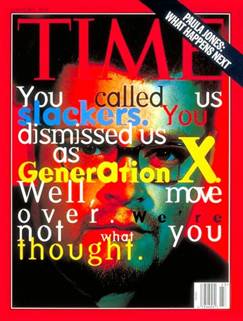
As a member of the latest Nomad generation I’m anxious to know what will be expected of me during the Crisis period we have entered. By thoroughly analyzing the Lost Generation, I hope to gain an understanding of my possible role over the next 15 to 20 years. Strauss & Howe named my generation the 13th, while it is commonly referred to as Generation X. This generation consists of everyone born between 1961 and 1981. Strauss & Howe summarize the generation as follows:
The 13th Generation (Nomad, born 1961-1981) survived a “hurried” childhood of divorce, latchkeys, open classrooms, devil-child movies, and a shift from G to R ratings. They came of age curtailing the earlier rise in youth crime and fall in test scores—yet heard themselves denounced as so wild and stupid as to put The Nation At Risk. As young adults, maneuvering through a sexual battlescape of AIDS and blighted courtship rituals—they date and marry cautiously. In jobs, they embrace risk and prefer free agency over loyal corporatism. From grunge to hip-hop, their splintery culture reveals a hardened edge. Politically, they lean toward pragmatism and nonaffiliation, and would rather volunteer than vote. Widely criticized as “Xers” or “slackers,” they inhabit a Reality Bites economy of declining young-adult living standards.
In every Fourth Turning the catalyst is predictable but the culmination is not. We entered the current Fourth Turning Crisis period in 2008. It will likely not conclude until the early 2020s. Each generation will need to play their part. The Baby Boomer Prophets will push to resolve ever-deepening moral choices, addressing issues that have been ignored for decades. The Millennial Heroes will challenge the political failure of elder-led crusades, fueling a society-wide secular crisis. The Artist children will be over-protected and shielded from the coming turmoil. My Nomad Generation X cohorts will provide the pragmatic ideas, realistic solutions, and no nonsense leadership required during a Crisis. We will apply toughness and resolution to defend society while safeguarding the interests of the young. As our Lost Generation forefathers displayed, we will sacrifice our financial well being on behalf of our children and their children. Our sense of duty will not allow us to kick the difficult decisions down the road like the Boomer generation has done.
I was born in 1963. My noteworthy memories as a child were of the Vietnam War, hippies, Watergate, gas lines, refinery fires, and a strike that broke my Dad’s union. I was brought up by Silent Generation conformist parents. I grew up during a period of social upheaval, a divisive war, gas shortages, failed Presidencies, inflation and high crime rates. As children we were unsupervised and free to roam the town on our bikes. The drinking age was 18, but most kids were drinking beer by the age of 14. Drugs were easily accessible, even in Catholic school. I wasn’t given anything that I didn’t earn. I went to Drexel University because it had a Co-op program that allowed me to work and pay for my education. I graduated from college in 1986 at the outset of the Unraveling. I’ve always had confidence in my own abilities, got my CPA license and went to school at night for 3 years to earn my MBA. I’ve worked for eight different companies over the last 24 years. Hard work, honesty, common sense, a skeptical nature and living below my means has left my family, at the age of 46, in good financial condition.
Personal success and public cynicism marked the period from 1984 until 2005. Reagan provided the jolt of confidence after the disastrous Carter years. The rhetoric was more convincing than the results. This was a common theme over the last twenty years. Politicians proclaimed that our economy was the strongest in the world and American ingenuity and exceptionalism would lead the new global economy. But, a funny thing happened on the way to Mount Olympus. The Boomer politicians ran the National Debt from $1.6 trillion to $8 trillion by 2005. National problems like unfunded liabilities for Social Security and Medicare, energy dependence on the Middle East, and the gutting of American industry by corporate oligarchs and Wall Street were ignored and downplayed by those in power. Individualism, materialism and greed were the chief traits exhibited by Nomads and Boomers alike. Real weekly average earnings were $279 in 1984. Real weekly average earnings were $278 in 2005. The average American got nowhere in two decades. Instead, the average American was lured into a false sense of wealth by bankers who offered “easy” credit. While wages stagnated, consumer debt soared from $450 billion in 1984 to $2.3 trillion by 2005. While the middle class sunk further into debt, the richest of the rich reaped ungodly profits. Corporate CEOs made 500 times more than the lowest paid workers as they generated profits by shipping US jobs to China. While financial hurricanes swirled over the horizon, the country was distracted by meaningless side issues like Presidential blowjobs, gay marriage, the internet, day trading, house flipping and gays in the military. The mood darkened as terror attacks, Middle Eastern wars, government expansion and financial booms and busts have led to widespread distrust of politicians in Washington and bankers on Wall Street.
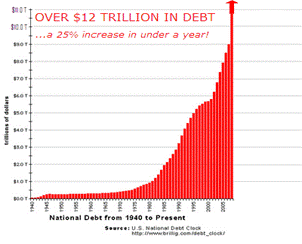
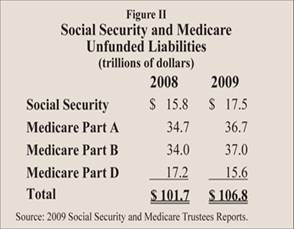
MILLENNIAL CRISIS
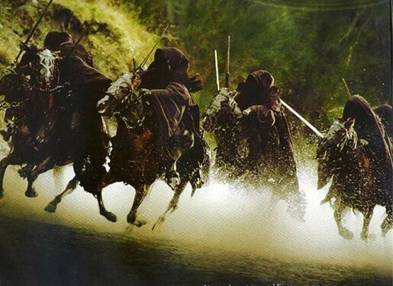
So now what? The spark that triggered the current Crisis was the fraudulent housing boom that led to the collapse of the worldwide financial system in 2008. The Stamp Acts catalyzed the American Revolution, the election of Lincoln catalyzed the Civil War, the Crash of ‘29 catalyzed the Depression/WW II era. We are currently in the midst of the Greater Depression. Once every 80 to 100 years, the archetypes reach an explosive mixture, vividly lowering the threshold for a spark of history to ignite a Crisis. Anyone who does not acknowledge a dramatic change in the mood of the country in the last 5 years isn’t paying attention. Many dogmatic linear thinkers are being blindsided by the passion and anger being exhibited across the land. They attempt to dismiss this mood transformation as a passing storm. The Boomer Prophets have led the country into this Crisis, as they have controlled the levers of government and Wall Street for the last ten years. Their unchecked and unregulated actions caused the financial Crisis we are still confronting. Doug Casey assesses the danger of having this generation in charge during this Crisis:
“The Boomers in Elderhood will be dogmatic, harsh, puritanical, and quite willing to burn down the barn in order to destroy whatever rats they see.”
In past Crisis periods strong leader Prophets like Lincoln and Roosevelt guided the nation through the Crisis. Nomads like Washington, Grant, Eisenhower, Patton, Bradley, and Truman did the heavy lifting. They gave the orders that killed thousands but saved millions. I have difficulty recognizing people in positions of power today that measure up to these standard bearers of American history. Hope is not one of my strongest traits. I prefer factual analysis, logical solutions, and honest debate. Who will rise to the occasion now? Strauss & Howe’s assessment of how my Nomad generation will react during this Crisis matches what I would expect from myself:
“Playing to win but half expecting to lose, Nomad generations enter midlife with a sense of exhaustion. By now they take for granted widening gaps between classes, ethnicities, regions and gender roles. The ablest among them emerge as cunning, pragmatic, and colorful public figures. When the Crisis hits, they find their lives painfully split between the old order and new. But they rise fiercely (and sacrificially) to the occasion, able to make hard and fast choices without fretting much about what others think. Exalting the workable over the ideal, midlife Nomads forge an effective alliance with the elder Prophets. Yet people of other ages are quick to criticize them and slow to give them praise.”
My fellow Nomads are now 29 to 49 years old. I’m accused of being negative, Mr. Doom & Gloom, and a cynical son of a bitch. Those are my best traits. I personally think I’m a pugnacious realist who uses facts to analyze every issue. Ideologues on both sides of the aisle irritate me to the point of distraction. People who blather on with slogans and talking points with no substance infuriate me and regularly feel my wrath. I couldn’t care less what people think about me or my ideas. I do feel caught between the old order and the new order. I am willing to sacrifice my future for the future of my children. I am ready to fiercely tackle whatever events arise in the next decade. I feel little stake in the old order. I’m convinced that the existing civic structure has failed miserably and will need to be torn down. When reading Strauss & Howe’s prediction of how Generation X will react to the Crisis, it seems like they know me:
“They will have reached full adult maturity without ever having believed in either the American Dream or American exceptionalism. They will never have known a time when America felt good about itself, when its civic and cultural life didn’t seem to be decaying. From childhood into midlife, they will have always sensed that the nation’s core institutions mainly served the interests of people other than themselves.”
As opposed to Boomer narcissism and inability to make an even minor sacrifice for the public good, my generation will vote against its own self interest if it truly will benefit future generations. We will be results oriented. We will support ideas that work and thrash those that put forth ideological claptrap fallacies. As long as the Boomers are made to pay a high price, we’ll be ready to pay more than our fair share to save the country from fiscal catastrophe. Undeliverable promises made by prior generations will be swept aside by Nomad politicians who aren’t worried about hurting feelings. Examples of current Nomad leaders are New Jersey Governor Chris Christie and Wisconsin Congressman Paul Ryan, who will not let past promises deter them from solving problems. It will be our job to stop the Boomer Prophets from potentially destroying the world.
It is clear how my generation will react during this Crisis. Now if I only knew what I’m going to be reacting to. Previous Crisis periods give hints of what can be expected, but the specific events are unknowable. All three previous Crisis periods in U.S. history began over financial related issues and degenerated into all encompassing total war. These wars were fought with maximum fury and ended with complete victory and domination by the winner. The current Crisis began with a financial collapse caused by Federal Reserve economic policies and rampant fraud throughout the financial services and banking industry. The Keynesian worshippers in charge of the government have taken actions that have given a false sense of recovery. By increasing the National Debt by $3 trillion in two years and putting the country on a path to a $25 trillion National Debt, the current administration has set in motion a series of events that will ruin our economy. As part 2 of this Depression sets in, the more dangerous part of the Crisis will commence.
The confluence of events and alignment of generational moods are a perilously explosive mixture. A deepening financial crisis, combined with an impending worldwide shortfall in oil (10 million barrels per day by 2015 according to the U.S. military), and a volatile worldwide military situation will likely lead to a major war. The deteriorating worldwide financial crisis will spur trade wars, currency depreciation and debt defaults. These tensions will combine with the panic of peak oil and Middle East terrorism to cause a World War centered in the Middle East. The spark could be an attack on Iran, a terror attack in the U.S., an overthrow of the Saudi Royal family, a conflict between Pakistan and India, or another conflict not foreseen by anyone. How the leaders of the United States react to such an event will determine the future path of this Crisis.
There are no guarantees that our country will exit this Crisis a stronger nation or even a nation at all. The resolution of this Crisis will be dependent upon the actions of politicians who control the strings of power in Washington DC. If they make foolish, short-term, rash choices, they will endanger the very existence of our country. The vast majority of Americans does not trust their leaders or support their policies. They do not support the wars of choice in the Middle East. Without the support of the public, our leaders will not be able achieve the consensus needed to lead the nation through a terrible Crisis. This fact leaves open the possibility that this Crisis devolves into a civil war scenario of social chaos, American soldiers confronting American citizens, and the breakdown of our suburban sprawl society. Tough times will require tough people, tough decisions, and a little luck. Will we meet this challenge as our forefathers met their challenges? Will this Crisis end in glory or the end of our Democratic experiment? General Patton reflected upon both possibilities.
“If a man has done his best, what else is there?” – George S. Patton
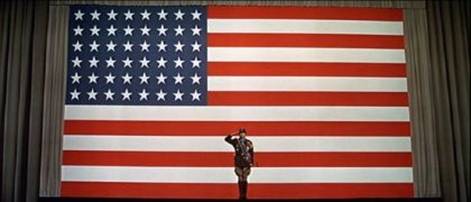
“For over a thousand years, Roman conquerors returning from the wars enjoyed the honor of a triumph – a tumultuous parade. In the procession came trumpeters and musicians and strange animals from the conquered territories, together with carts laden with treasure and captured armaments. The conqueror rode in a triumphal chariot, the dazed prisoners walking in chains before him. Sometimes his children, robed in white, stood with him in the chariot, or rode the trace horses. A slave stood behind the conqueror, holding a golden crown, and whispering in his ear a warning: that all glory is fleeting.” – George C. Scott as Patton

The time to fight is here. This country needs to be fixed. The old ways must be discarded. Promises need to be broken. It is a time to speak out and tell the truth. It is a time to act. It is a time for sacrifice. I’m ready. Are you?
To everything there is a season, and a time to every purpose under the heaven;
A time to be born, and a time to die; a time to plant, and a time to pluck up that which is planted;
A time to kill, and a time to heal; a time to break down, and a time to build up;
A time to weep, and a time to laugh; a time to mourn, and a time to dance;
A time to cast away stones, and a time to gather stones together; a time to embrace, and a time to refrain from embracing;
A time to get, and a time to lose; a time to keep, and a time to cast away;
A time to rend, and a time to sew; a time to keep silence, and a time to speak;
A time to love, and a time to hate; a time of war, and a time of peace.
Ecclesiastes 3: 1-8
PEACOCK SYNDROME – AMERICA’S FATAL DISEASE
“There will be, in the next generation or so, a pharmacological method of making people love their servitude, and producing dictatorship without tears, so to speak, producing a kind of painless concentration camp for entire societies, so that people will in fact have their liberties taken away from them, but will rather enjoy it, because they will be distracted from any desire to rebel by propaganda or brainwashing, or brainwashing enhanced by pharmacological methods. And this seems to be the final revolution.” – Aldous Huxley


Researchers at the University of Texas recently published a study about why men buy or lease flashy, extravagant, expensive cars like a gold plated Porsche Carrera GT. There conclusion was:
“Although showy spending is often perceived as wasteful, frivolous and even narcissistic, an evolutionary perspective suggests that blatant displays of resources may serve an important function, namely as a communication strategy designed to gain reproductive rewards.”
To put that in laymen’s terms, guys drive flashy expensive cars so they can get laid. Researcher Dr Vladas Griskevicius said: “The studies show that some men are like peacocks. They’re the ones driving the bright colored sports car.”
Lead author Dr Jill Sundie said: “This research suggests that conspicuous products, such as Porsches, can serve the same function for some men that large and brilliant feathers serve for peacocks.” The male urge to merge with hot women led them to make fiscally irresponsible short term focused decisions. I think the researchers needed to broaden the scope of their study. Millions of Americans, men and women inclusive, have been infected with Peacock Syndrome. Millions of delusional Americans thought owning flashy things, living in the biggest McMansion, and driving a higher series BMW made them more attractive, more successful, and the most dazzling peacock in the zoo.
This is not an attribute specific to Americans, but a failing of all humans throughout history. Charles Mackay captured this human impulse in his 1841 book Extraordinary Popular Delusions and the Madness of Crowds:
“Men, it has been well said, think in herds; it will be seen that they go mad in herds, while they only recover their senses slowly, and one by one.”
The herd has been mad since 1970 and with the post economic collapse of 2008, some people are recovering their senses slowly, and one by one. The country was overrun by flocks of ostentatious peacocks displaying their plumage in an effort to impress their friends, families and work colleagues. What set the flaunting American peacocks apart was the fact they financed their splendid display of plumage with $0 down and 0% interest for seven years. The lifestyles of the rich and famous miraculously became available to the poor and middle class through the availability of easy abundant credit provided by the friendly kind hearted Wall Street banks and their heroin dealers at the Federal Reserve.
The United States has experienced a four decade long “expenditure cascade”. An expenditure cascade occurs when the rapid income growth of top earners fuels additional spending by the lower earner wannabes. The cascade begins among top earners, which encourages the middle class to spend more which, in turn, encourages the lower class to spend more. Ultimately, these expenditure cascades reduce the amount that each family saves, as there is less money available to save due to extra spending on frivolous discretionary items. Expenditure cascades are triggered by consumption. The consumption of the wealthy triggers increased spending in the class directly below them and the chain continues down to the bottom. This is a dangerous reaction for those at the bottom who have little disposable income originally and even less after they attempt to keep up with others spending habits.
This cascade of expenditures could not have occurred without cheap easy credit, supplied by Wall Street shysters and abetted by their puppets at the Federal Reserve through their inflationary policies. Real wages are lower today than they were in 1970. Coincidentally, the credit card began its ascendance as the peacock payment of choice in 1970. There are now over 600 million credit cards in circulation in the U.S. in the hands of 177 million fully plumed peacocks and peacock wannabes.
Monthly Payment Nation
“Consumerism requires the services of expert salesmen versed in all the arts (including the more insidious arts) of persuasion. Under a free enterprise system commercial propaganda by any and every means is absolutely indispensable. But the indispensable is not necessarily the desirable. What is demonstrably good in the sphere of economics may be far from good for men and women as voters or even as human beings.” – Aldous Huxley

The country seemed to do just fine from 1945 through 1970 with no credit card debt and moderate levels of auto loan debt. In fact, this period in U.S. history was marked by strong economic growth created by capital investment, savings, and the American middle class realizing the American dream of a better life based upon their work ethic. Around about 1970, the intersection of Baby Boomers coming of age, the belief that social justice for all was a noble goal, and Nixon’s closing the gold window, opened Pandora’s Box and the evil released has brought the country to the precipice of ruin. Today, consumer credit outstanding totals $2.43 trillion, or $22,000 per household. It peaked at $2.6 trillion in 2008 and the storyline fed to the masses was that Americans had seen the light and embraced frugality by paying off their debts. As with most storylines spouted by the mainstream media, it was completely false. The Wall Street banks wrote off over $200 billion since 2008, while delusional peacocks continued to finance and lease gas guzzling luxury automobiles, while charging their purchase of an iPad2 and Lady Gaga concert tickets on one of their 13 credit cards.
It seems a vast swath of America refuse to shed their peacock feathers. This explains why you see BMWs, Mercedes, Escalades, and Porsches parked in the driveways of $100,000 houses. Automobiles are the truest representation of American peacock syndrome. Very few people look at a car purchase in a rational long term financial sense. It’s about impressing the neighbors, your peers and your family. Driving a brand new luxury car gives you the appearance of success. The neighbors don’t know you are in debt up to your eyeballs. This explains why 30% to 40% of all luxury cars are leased. A man could buy a $20,000 Honda hybrid with 10% down and finance the rest at 0.9% for three years. His monthly payment would be $500. After three years he would own the car outright, with the added benefit of getting 45 mpg. He could then invest the $500 per month for the next seven years in gold and silver or something else that benefits from Federal Reserve created inflation. In today’s society this would be the act of a doo doo bird.




Why drive a putt putt car when you can drive the ultimate peacock machine – a BMW 528i with 24-valve inline 240-horsepower 6-cylinder engine with composite magnesium/aluminum engine block, Valvetronic, and Double-VANOS steplessly variable valve timing, 10-way power-adjustable driver’s and front passenger’s seat with 4-way lumbar support, and memory system for driver’s seat, steering wheel and outside mirrors, along with high-fidelity 12-speaker sound system, including 2 subwoofers under the front seats, and digital 7-channel amplifier with 205 watts of power. Plus it looks really cool. This materialism machine can be leased for the same $500 per month that the doo doo bird pays for his Honda hybrid. Of course, after three years of renting luxury wheels the peacock has to turn in the 528i and lease an equally luxurious auto because driving an economy car would now harm his reputation. Colorful plumage is everything to a peacock.
Sometime over the years Americans lost their bearings and began to ignore a basic truth. The only way to accumulate wealth is to spend less than you make and save the difference. Over a ten year time frame the peacock will have dished out $60,000 renting luxury cars, while the doo doo bird will have expended $21,000 during the first three years and then invested $500 per month for 84 months, leaving him with a net $25,000 asset, based on a modest investment return of 5%. The doo doo bird ends up $85,000 wealthier than the peacock at the end of ten years. If you peruse the car dealer advertisements in your local paper, the price of the car is rarely even printed, only the monthly lease payment or 0% financing offer. There is a reason why the average American lives paycheck to paycheck, has no emergency fund for a rainy day, and has virtually no retirement savings socked away. Status, reputation and the appearance of success became more important to millions of Americans than living within their means and actually sacrificing and doing the hard work required to succeed. Delayed gratification is an unknown concept in America.
In 1970, 37% of households consisted of 4 or more people and we somehow managed to get by with one four door car per household. Today, only 24% of households consist of 4 or more people. There are 113 million households and over 250 million passenger vehicles, or 2.2 per household. So, even though the number of people in our households has shrunk dramatically, we needed 120% more vehicles to transport our vast quantities of stuff. Not only do we have more vehicles, but the size of these symbols of gluttony has doubled and tripled, with fitting names like: Tundra, Navigator, Titan, Yukon, Suburban and Hummer. Every soccer mom with two kids needed a 20 foot long, 6 foot high Yukon with an 8 cylinder engine, getting 12 mpg to shuttle around little Aiden and Chloe to their ten scheduled weekly activities. It wasn’t only automobiles that Americans went gaga over. The average home size in 1970 was 1,400 square feet (we drive cars bigger than that today). By 2009, the average home size reached 2,700 square feet. God knows we need 12 rooms for our 2.4 person households. The expenditure cascade started as a trickle in 1970 but became a raging uncontrollable waterfall by 2008.

Delusional Americans have been slowly lured into the web of debt and living their lives based upon whether they can make the monthly payment on their debt. I can anticipate the outrage from those who declare it wasn’t them, it was the other guy. Everyone has an excuse for why they aren’t to blame, but the facts speak otherwise:
- Non-revolving (auto & education) debt outstanding is at an all-time high of $1.64 trillion.
- The average auto loan is now $27,000 with a loan to value ratio of 80% to 90%, down from 95% in 2007.
- Auto dealers are now offering $0 down and 0% interest for 72 months on many models. Ask yourself how a finance company can make a profit with those terms.
- There are 54 million households with a revolving credit card balance, proving that approximately 50% of Americans are attempting to live above their means.
- The average credit card debt per household with credit card debt is $14,687.
- The average APR on a new credit card is 15%, even though the banks can borrow from the Federal Reserve for 0.25%.
- In 2009, the United States Census Bureau determined there were nearly 1.5 billion credit cards in use in the U.S. A stack of all those credit cards would reach more than 70 miles into space — and be almost as tall as 13 Mount Everests.
- 76% of undergraduates have credit cards, and the average undergrad has $2,200 in credit card debt. Additionally, they will amass almost $20,000 in student debt.
- On average, today’s consumer has a total of 13 credit obligations on record at a credit bureau. These include credit cards (such as department store charge cards, gas cards, and bank cards) and installment loans (auto loans, mortgage loans, student loans, etc.).
- Over 90 percent of African-American families earning between $10,000 and $24,999 had credit card debt. What bank in their right mind would issue a credit card to someone making $15,000 per year?
- Discussing credit card debt is highly taboo. The topics at the top of the list of things that people say they are very or somewhat unlikely to talk openly about with someone they just met were: The amount of credit card debt (81%); details of your love life (81%); your salary (77%); the amount you pay for your monthly mortgage or rent (72%); your health problems (62%); your weight (50%). I wonder why?
- Penalty fees from credit cards added up to about $20.5 billion in 2009, according to R. K. Hammer, a consultant to the credit card industry. Don’t be one day late with that credit card payment. It’s good to be a bank.
- The average late fee was found to have risen to $28.19, way up from $25.90 in 2008. Consumer Action reported that late fees reached up to $39 per incident.
- The volume of gasoline purchases placed on credit cards jumped 39% last month from a year earlier, compared with a 21% increase in June 2010. Food shopping increased 5% after falling 7% last year. The value of an average transaction on credit cards outpaced the gain for debit cards, showing consumers are increasingly relying on borrowing to pay for gasoline and other necessities.
After decades of a debt financed contest to display the gaudiest plumage, is the average American happier? Considering more than 10% of all Americans are on anti-depressant drugs, I’d say not. The rat race for status, the appearance of wealth and visible faux displays of success do not increase well-being. If most of our earnings are spent on an empty game of status, we should not expect much improvement in our quality of life. There is something perverse about having more than enough. When we have more, it is never enough. It is always somewhere out there, just out of reach. This is the attitude that drives the criminals on Wall Street and politicians in Washington DC to constantly seek more power and wealth. The more we acquire, the more elusive enough becomes. Much of the debt financed purchases of consumer trinkets, baubles and gadgets is nothing more than an expensive anesthetic to deaden the pain of empty lives.
Based upon the facts, the average American has not benefitted from the decades long materialistic frenzy. They have sacrificed their futures for the fleeting glory of ephemeral riches. In fact, the average American could not have participated in the expenditure cascade had they not been enabled by the financial industry and cheap plentiful money provided by the financial industries’ drug dealer – the Federal Reserve. The financial industry complex used their power and wealth to utilize all means of propaganda and mass media outlets to convince Americans that debt was good and more debt was even better. I’ll address the insidious aspects of the unholy union of debt and propaganda in Part Two – Propaganda Nation Built Upon Delusions of Debt.
Meanwhile, millions of Americans cling to their borrowed peacock feathers as the butcher of reality bears down upon them. The end won’t be pretty. The brave conquerors of strip malls across the land can enjoy their toys, gadgets, and treasures for awhile longer, but they need to remember one thing – Glory is fleeting and death can come suddenly.


“For over a thousand years Roman conquerors returning from the wars enjoyed the honor of triumph, a tumultuous parade. In the procession came trumpeteers, musicians and strange animals from conquered territories, together with carts laden with treasure and captured armaments. The conquerors rode in a triumphal chariot, the dazed prisoners walking in chains before him. Sometimes his children robed in white stood with him in the chariot or rode the trace horses. A slave stood behind the conqueror holding a golden crown and whispering in his ear a warning: that all glory is fleeting.”
WORLD WAR III
Patton: Men, all this stuff you’ve heard about America not wanting to fight, wanting to stay out of the war, is a lot of horse dung. Americans traditionally love to fight. All real Americans love the sting of battle. When you were kids, you all admired the champion marble shooter, the fastest runner, big league ball players, the toughest boxers. Americans love a winner and will not tolerate a loser. Americans play to win all the time. I wouldn’t give a hoot in hell for a man who lost and laughed. That’s why Americans have never lost, and will never lose a war… because the very thought of losing is hateful to Americans.

Again, I’m very impressed that Marketwatch allows Paul Farrell to write articles like this. No one in the MSM has the guts to tell it like it is. Paul Farrell is absolutely right. The hysterics over mosques and the threat of Iran are signs of what is coming. The American people are being stirred into a war frenzy based on fear of Muslims. This frenzy of fear is being led by the far Right neo-cons like Gingrich and Cheney. They will regain power in 2012. I don’t know if Mr. Farrell has read the Fourth Turning, but his scenario is exactly what would be expected during a Fourth Turning. Gingrich is a Boomer Prophet. He fits the bill as the leader that takes the US into a world war. Peak oil, dwindling fresh water supplies, Muslim extremists, nuclear weapons, and a worldwide economic Depression are the deadly mix that will lead to World War III.
You can stay in the delusion of hope camp, but it won’t stop history. We are headed into dark dark days. Americans are completely unprepared for what awaits them in the next 10 years. War is just over the horizon.
WWIII ahead: Warfare defining human life by 2020
Commentary: ‘Mother of all national security issues: desperate wars over food, water, energy’
By Paul B. Farrell, MarketWatch
ARROYO GRANDE, Calif. (MarketWatch) — World War III is coming. Iraq and Afghanistan? Just warm-up acts. Foreign-policy blunders with huge economic consequences: Massive domestic debt handicapping future generations. But still just warm-up acts.
The main event: WWIII will engulf America in a “New Age of Warfare” with trillions and trillions and trillions of new debt, year after year after year. Yet we’re silent, in denial. Nobody’s talking about all this new debt ahead.
WWIII: ‘The mother of all national security issues’
Still you’re in denial? Can’t see, hear, believe? You hope we come back?
WWIII: ‘By 2020 there is little doubt something drastic is happening’
More denial. We think short-term, this quarter, this election cycle. It’ll work out.
WWIII: ‘The planet’s carrying capacity is shrinking’
And yet still you refuse to listen. It all sounds too eco-freak lefty.
WWIII: ‘Desperate, all-out wars over food, water, and energy supplies’
Still you dismiss it as hype, propaganda, brainwashing from the Pentagon war machine.
And, yes, historians and shrinks agree you will stay in denial … till it’s too late.
Proof? Remember Jeremy Grantham. A savvy investor managing $100 billion in assets. Listen to his take on the 2008 meltdown: “Several dozen people saw this crisis coming for years. It seemed so inevitable and so merciless. Yet the bosses of Merrill Lynch and Citi, even Paulson and Bernanke, none saw it coming.”
Greed blinds us. So we will be unprepared, miss the next disaster, meltdown, catastrophe … the coming WWIII.
Why can’t we open our eyes? Wake up before it’s too late? Why don’t we learn the lessons of history? Sadly, centuries of history prove we never change … till it’s too late.
Proof? Remember “This Time is Different: Eight Centuries of Financial Folly” by Carmen Reinhart and Kenneth Rogoff, two brilliant economists. They warn: “The lesson of history is there will always be a temptation to stretch the limits. One common theme, excessive debt accumulation — whether government, banks, corporations, or consumers — often poses greater systemic risks than it seems during a boom. We merrily roll along for an extended period, when bang … confidence collapses, lenders disappear, a crisis hits. History does point to warnings signs that policy makers can look to access risk — if only they do not become too drunk with their credit-bubble-fueled success and say, as their predecessors have for centuries, ‘This time is different.'”
We’re addicts, more is never enough, we ignore history lessons
Humans are addicted to greed, success, wealth. More is never enough: “The lesson of history is there will always be a temptation to stretch the limits.” Leaders always stretch the limits, like gamblers who just can’t go home till they lose everything.
Besides, that “mother of all national security issues won’t happen till 2020?” Too far in the future, so our short-term brains dismiss it. … So what if “the planet’s carrying capacity in shrinking?” … So what if “an ancient pattern of desperate, all-out wars over food, water, and energy supplies is emerging?” … So what if “warfare defines human life?”
So what else is new? Wars: WWII, Korea, Vietnam, Grenada, Kosovo, Iraq, Afghanistan. Think positive. Wars create new economic opportunities. The “green revolution.” Job growth. Commodity deals. Innovations. Think positive. Technology will solve all future problems. Have faith. Trust. Wait. Enjoy life now.
Yes, WWIII is coming. And in 2020 we may wake up and remember we were warned about the disastrous consequences of invading Iraq back during the invasion when Nixon advisor Kevin Phillips wrote in Wealth and Democracy, warning: “Most great nations, at the peak of their economic power, become arrogant, wage great world wars at great cost, wasting vast resources, taking on huge debt, and ultimately burning themselves out.”
The real reason … we love wars, it’s a macho ego thing
Now shift from the lessons of history to the lessons of psychology. Forget everything the Pentagon says. It’s a distraction. The real reason WWIII is coming is not because “they” are attacking “us.” … Not because the GOP, Tea-Party, Reaganites and their beloved Reaganomics all love a crisis. … Not because the Right believes it’s written in Revelations … Not because a secret conspiracy of the superwealthy believe wars are great for economic recovery.
No, WWIII is coming because Americans love war; it’s in our psyche, genes, DNA, blood, our cultural mythology. Deep in our souls we are greedy war-mongers, war-profiteers … we love wars.
WWIII is coming because America needs a war to prove that we really are still “king of the hill,” the world’s sole superpower. That we’re not falling second to China and the rest of the world. Forget economics, politics, ideologies: WWIII is a macho ego thing.
We want to revive the days when John Wayne, Patton, “The Dirty Dozen,” “Apocalypse Now” defined us; we were a nation of war heroes. Now our “heroes” are corrupt Wall Street fat-cat CEOs who lose billions and still retire rich, con men for Treasury secretaries, bought presidents, governors who resign early, lie to grand juries and walk the Appalachian trail, ad infinitum. We have lost face, lost faith in our heroes, in our world. Unlike thousands indicted after the S&L and Enron disasters, our dark heroes “get away with murder.”
Destiny knocks … the Righteous Right will lead us into WWIII
WWIII is coming because America needs a war, another great war. Admit it. We all sense it at a deep level. Yes we hate to admit the truth. It hurts too much to admit our moral weakness: America’s losing power, swagger, mojo, cohones. We don’t like feeling impotent, weak, vulnerable. So the bullying Right, the insecure, defensive and full-of-hate, dark side of the Party-of-No-No has decided to be the champion-of-the-return-to-the-glory-days … and they are itching for new wars.
First: before WWIII we prepare with internal civil wars. The Right attacks the Left, spewing lies, feeding rage everywhere like the angry high school bully who lost the election for class president because his future was pure self-serving narcissism. Now ego bruised, second-best, he’s consumed by hatred and revenge. Anything to regain the throne, no matter how immoral, corrupt, mean-spirited — the end justifies the means.
WWIII is coming because once the Right gets back in power — and they will soon — a new Righteous Right White House will act swiftly to reestablish its sole superpower role. Remember “bomb, bomb, bomb Iran?” Under the laughter a hidden agenda. Some foreign-policy pundits agree we’d already be at war with Iran (and Islam) if the Bullying Right won the presidency.
When they win back the commander-in-chief role it will happen again, a repeat of the Cheney deceits that drove America into the Iraq-Afghan Wars.
WWIII will be intoxicating … but will bankrupt the drunk’s soul
Chris Hedges captures America’s bizarre collective addiction to war. In “War is a Force that Gives Us Meaning” this former war correspondent describes how a “communal march against an enemy generates a warm, unfamiliar bond with our neighbors, our community, our nation, wiping out unsettling undercurrents of alienation and dislocation.”
He reminds me of my days going off to the Marine Corps and Korea. As one reviewer put it, Hedges looks “at what makes war so intoxicating for soldiers, politicians and ordinary citizens,” the “outbreaks of nationalism, the wartime silencing of intellectuals and artists, the ways in which even a supposedly skeptical press glorifies the battlefield and other universal features of war.” Yes, yes, we love war.
WWIII is coming not because we have terrorists, dictators and evil men wanting to destroy and depose us. Not because “they” are attacking “us.” WWIII is coming because we have surrendered the fight, surrendered our honor, our integrity, our values, our moral compass as a democracy. We have surrendered to a new god, to the almighty dollar, the new Invisible Hand that controls not just capitalism but our nation’s very soul.
Bottom line: We are at war with ourselves. Split souls, a hero, a demon. But we do not like ourselves, can no longer face ourselves in the mirror. Why? Our dark side is winning. The other has surrendered. We have lost our “self” in denial. Now the Righteous Right is bullying us with hope of redemption. False hope. That’s suicide.
Still we are waiting to start World War III. And if the wait is too long, the Right will start to “bomb, bomb, bomb” someone and trigger WWIII. It’s a macho “ego thing.” They got a lot to prove. Don’t care if they destroy America in the process … because they know they are Right. Yes, folks, the real “mother of all national security issues” is within us.




